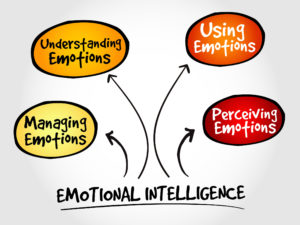 Emotional triggers are thoughts, feelings, or events that trigger an emotional response. These emotional triggers can be positive or negative. It all depends on how you choose to react or respond. Your responses may have been negative at some point but along the way you learned how to deal with these emotions constructively and turn them into a positive lesson or just simply let it go. Ultimately, it is a matter of choice. We’ve all been triggered at some point in our lives. You may have lost your cool at a board meeting or you may have been elated for being acknowledged for an award.
Emotional triggers are thoughts, feelings, or events that trigger an emotional response. These emotional triggers can be positive or negative. It all depends on how you choose to react or respond. Your responses may have been negative at some point but along the way you learned how to deal with these emotions constructively and turn them into a positive lesson or just simply let it go. Ultimately, it is a matter of choice. We’ve all been triggered at some point in our lives. You may have lost your cool at a board meeting or you may have been elated for being acknowledged for an award.
“How you react emotionally is a choice in any situation.” – Judith Orloff
What Triggers You?
Every day you encounter things that trigger you. Think about how you feel when you watch your children play sports or read to you. Think about how you feel when someone cuts you off in traffic. A song may remind you of an event in your past and flood you with memories. Whereas, a pile of dishes on the counter may trigger an emotional response of frustration, disappointment, or anger after you had asked your teenager several times to put them in the dishwasher. When you get angry, your body responds like it being attacked. It jumps into the “fight or flight” mode to keep you safe. It is times like this that your body is in “fight or flight” mode that you will not think rationally and you may say things that you may regret.
“Certain things leave you in your life and certain things stay with you. And that’s why we’re all interested in movies-those ones that make you feel, you still think about because it gave you such an emotional response, it’s actually part of your emotional makeup-in a way.” Tim Burton
Use Emotional Triggers to Your Advantage
It is important to take notice of what things emotionally trigger you. Your  environment may be an emotional trigger for you: clutter, noise, or conflict. You can try and run and hide and avoid situations that trigger your emotions or you can deal with it head on. Positive emotions do not appear to cause much of a problem because people are happy and joyful and act in a positive way. The negative emotions can hinder communication and potentially harm relationships if not used constructively. You can use your emotional triggers to your advantage and express your emotions in a positive way.
environment may be an emotional trigger for you: clutter, noise, or conflict. You can try and run and hide and avoid situations that trigger your emotions or you can deal with it head on. Positive emotions do not appear to cause much of a problem because people are happy and joyful and act in a positive way. The negative emotions can hinder communication and potentially harm relationships if not used constructively. You can use your emotional triggers to your advantage and express your emotions in a positive way.
“In order to move on, you must understand why you felt what you did and why he you no longer need to feel it.”-Mitch Albom, The Five People You Meet In Heaven
Recognize you’re being emotionally triggered. If you pay attention to how your body reacts or feels in a situation, you will be able to notice that you are being emotionally triggered.
Identify the emotion you’re having. What is the emotion that you’re feeling? Stop and take notice of what emotion you are feeling. When you identify it, you can manage it.
Choose to react or respond. Your thoughts and feelings influence your actions and behaviors. How do you choose to use the emotion that you are feeling? Remember avoidance is a choice and the response.
Regulate your emotions. What is the emotion you want to feel? What will you do differently based on the new emotion to respond or react to the situation?
When Emotions are Running High
Here are some simple things that you can do when your emotions are running high due to lack of sleep, increased stress, and lack of me time. Research studies show that sleep deprivation impairs accurate a recognition of emotions and impairs emotional judgment and decision-making. Lack of sleep also impacts your attention and impairs your performance. Before you react, take a step back from the situation for a short time to compose yourself and choose to respond.
- Take a deep breath. Remember you work worked with everything you need to handle a situation.
- Splash some cold water on your face and wait till you have calmed down.
- Take a walk.
- Sit in silence.
- Have a cup of coffee or tea.
- Listen to music
- Keep a journal and track your emotional triggers recording what thoughts you’re having and what is going on around you. Think about how you could respond persist react.
- Talk to family and friends when times get tough.
- Be kind to yourself. Ensure that you are getting enough sleep, eating healthy, and getting enough exercise.
- Be aware of self-talk that does not serve you.
As you learn more and understand your own triggers, you will also be more empathetic to those around you. You have been there and you understand that it’s not easy but you made a choice to respond. Being able to use you emotional triggers to your advantage can build strong relationships, improve your communication, improve performance, and make better decisions.
How will you use your emotions to your advantage?
DEBRA KASOWSKI, BScN CEC is an award-winning best-selling author, transformational speaker, blogger, and Certified Executive Coach. She has a heart of a teacher and is certified in Appreciative Inquiry and Emotional Intelligence. She is a contributing writer for Diversity Magazine and Fabulous at 50 Magazine. Debra Kasowski International helps executives, entrepreneurs, and organizations boost their productivity, performance, and profits. It all starts with people and passion. www.debrakasowski.com
 Small picture thinkers are reactive rather than responsive. They focus on the small things versus the impact on the bigger picture. They fail to see that all circumstances are temporary and anything that is temporary can change. They do not ask questions about how thinks can be different. Small picture thinkers focus on counting their losses versus the gains that they have. They focus on the negativity of a situation and get lost in the blur activities that take up their day and exhaust them.
Small picture thinkers are reactive rather than responsive. They focus on the small things versus the impact on the bigger picture. They fail to see that all circumstances are temporary and anything that is temporary can change. They do not ask questions about how thinks can be different. Small picture thinkers focus on counting their losses versus the gains that they have. They focus on the negativity of a situation and get lost in the blur activities that take up their day and exhaust them.
 This statement makes me think of the movie, “Groundhog Day” (1993) starring Bill Murray and Andie MacDowell where Bill Murray is continually taking the same actions and attending the same events, repeating each day over and over.
This statement makes me think of the movie, “Groundhog Day” (1993) starring Bill Murray and Andie MacDowell where Bill Murray is continually taking the same actions and attending the same events, repeating each day over and over. World-class executive coach Marshall Goldsmith states: “correcting the behavior, you will discover, does not require polished skills elaborate training, arduous practice or supernatural creativity. All that’s required is the faint imagination to stop what you been doing in the past-in effect-to do nothing at all.” What Goldsmith means “by doing nothing at all” is stopping behaviors like passing judgments, making excuses, hanging onto the past, negative thinking, adding our two cents to every discussion, and always having to win at all costs. How does it impact you or others? Sometimes the best thing you can do or say is nothing at all.
World-class executive coach Marshall Goldsmith states: “correcting the behavior, you will discover, does not require polished skills elaborate training, arduous practice or supernatural creativity. All that’s required is the faint imagination to stop what you been doing in the past-in effect-to do nothing at all.” What Goldsmith means “by doing nothing at all” is stopping behaviors like passing judgments, making excuses, hanging onto the past, negative thinking, adding our two cents to every discussion, and always having to win at all costs. How does it impact you or others? Sometimes the best thing you can do or say is nothing at all.

 Let’s face it; problem solving and making decisions is not everyone’s cup of tea. Yet we make decisions every day. We decide what to wear, what to eat, and where to or not spend our money. Sometimes we even give others the authority to make decisions for us. This act alone can be dangerous if we have no insight into what some of those decisions might be.
Let’s face it; problem solving and making decisions is not everyone’s cup of tea. Yet we make decisions every day. We decide what to wear, what to eat, and where to or not spend our money. Sometimes we even give others the authority to make decisions for us. This act alone can be dangerous if we have no insight into what some of those decisions might be.